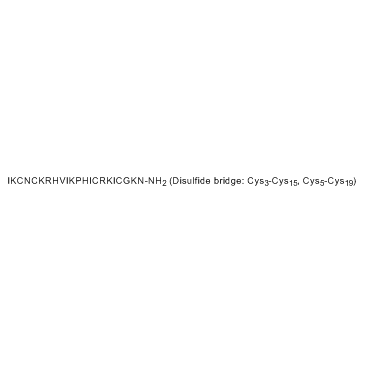Peptide 401 |
| Catalog No.GC31767 |
Peptide 401, a potent mast cell degranulating factor from bee venom, suppresses the increased vascular permeability due to intradermal injection of various smooth muscle spasmogens (histamine, and 5-HT).
Products are for research use only. Not for human use. We do not sell to patients.

Cas No.: 32908-73-9
Sample solution is provided at 25 µL, 10mM.
Peptide 401, a potent mast cell degranulating factor from bee venom, suppresses the increased vascular permeability due to intradermal injection of various smooth muscle spasmogens (histamine, and 5-HT).
Peptide 401 substantially inhibits the oedema provoked by subplantar injection of carrageenin or intra-articular injection of turpentine in the rat. The ED50 of 401 is c. 0.1 mg/kg. The anti-inflammatory effect is assessed by measurement of the increased 125I-albumin content of an injected site in comparison with an uninjected contralateral site. Peptide 401 also suppresses the increased vascular permeability due to intradermal injection of various smooth muscle spasmogens (histamine, bradykinin, 5-hydroxytryptamine (5-HT), and prostaglandins)[1]. Peptide 401 (MCD peptide) contains 22 residues and occurs in the venom of the common European honey bee to the extent of about 2% by weight . It has powerful anti-inflammatory activity (at doses as low as 0.1 mg/kg) in a variety of animal models, i.e., hind paw oedema in the rat induced by carrageenin or turpentine, adjuvant arthritis in the rat, and increased skin permeability in the rat resulting from subcutaneous injection of bradykinin, prostaglandin E1 kallikrein, histamine and 5- hydroxytryptamine (5-HT). It has a powerful degranulating effect on mast cells and involves the release of histamine and other pharmacologically active agents[2].
[1]. Hanson JM, et al. Anti-inflammatory property of 401 (MCD-peptide), a peptide from the venom of the bee Apis mellifera (L.). Br J Pharmacol. 1974 Mar;50(3):383-92. [2]. Banks BE, et al. Anti-inflammatory activity of bee venom peptide 401 (mast cell degranulating peptide) andcompound 48/80 results from mast cell degranulation in vivo. Br J Pharmacol. 1990 Feb;99(2):350-4.
Average Rating: 5 (Based on Reviews and 8 reference(s) in Google Scholar.)
GLPBIO products are for RESEARCH USE ONLY. Please make sure your review or question is research based.
Required fields are marked with *




















